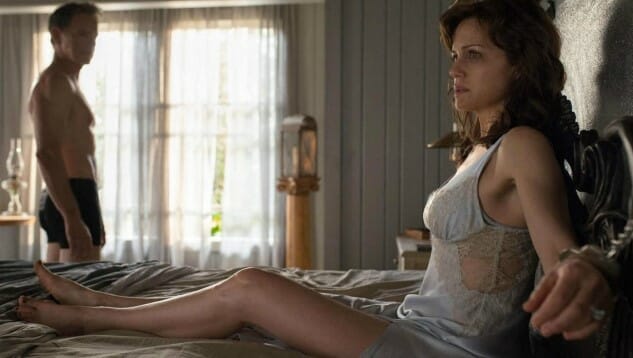Gerald’s Game

All of the best moments of Gerald’s Game are its quietest ones.
Sure, there’s screaming. And crying. And the sound of flesh being torn from skin, of a hungry dog dragging a corpse across the cold, hard ground. And yeah, those moments are effective. But none are as chilling as a woman’s own inner dialogue with the representations of some of her most self-destructive tendencies.
Gerald’s Game, out on Netflix just in time for Halloween season, is a Stephen King adaptation, although surely to be one that will receive much less attention than the blockbuster phenomenon of It, which we’ve already written about at length. This is no epic, 1,000-page story that has captured the imagination of a mass audience for decades. Rather, the Gerald’s Game source material is decidedly mundane and tidy, by King’s standards. It’s a novel that feels like it was adapted from a stage play: One location, extremely minimal cast of characters, built for a powerhouse central performance by the female lead. It’s not exactly one of King’s best-received or critically acclaimed works, and unlike It, it’s not a property that any passerby on the street would likely be able to describe, if quizzed.
For a filmmaker, that means a degree of freedom, and director Mike Flanagan makes the most of it. His version of Gerald’s Game trims fat, condenses and slims, stripping away some of the odder quirks of King’s novel to get at the heart of themes underneath. The result is a tense, effective thriller that goes out of its way to highlight two strong actors in an unfettered celebration of their craft…especially in those quiet moments.
This is nothing new for Flanagan, whose recent output in the horror genre has been commendable. It’s hard to overlook some of the recurring themes in his work, beginning with 2011’s Absentia and all the way through the wildly imaginative Oculus, Hush (also on Netflix) and Ouija: Origin of Evil. Every one of these films centers around a strong-willed female lead, as does Gerald’s Game. Is this coincidence? Or is the director drawn to stories that reflect the struggle of women to claim independence in their lives by shedding old scars or ghosts, be they literal or figurative?
Either way, it made Flanagan an obvious fit for Gerald’s Game, a story that begins with a husband and wife making a naive attempt at “spicing up” their love life through the use of handcuff restraints. The only problem is that once the cuffs are on, a slightly more sadomasochistic side of “daddy” starts coming to the surface. Also troubling: The old man’s heart isn’t quite what it used to be, especially when stressed by the combination of excitement and Little Blue Pills. It isn’t long before Jessie (Carla Gugino) finds herself trapped on the bed, still handcuffed beneath the rapidly cooling corpse of Gerald (Bruce Greenwood). And that’s when the fun begins.
-

-

-

-

-

-

-

-

-

-

-

-

-

-

-

-

-

-

-

-

-

-

-

-

-

-

-

-

-

-

-

-

-

-

-

-

-

-

-

-








































